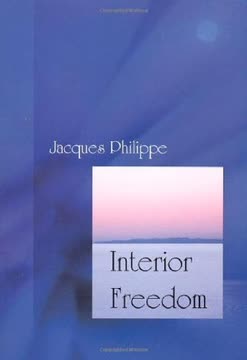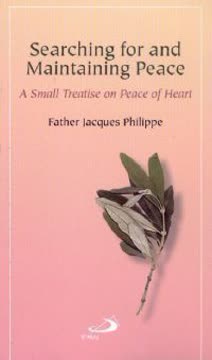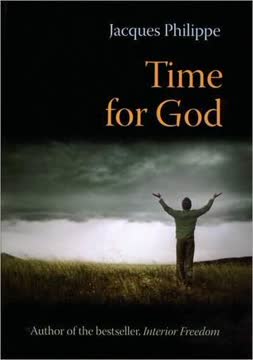Key Takeaways
1. Interior Freedom: A Divine, Unshakeable Inner Space
Every Christian needs to discover that even in the most unfavorable outward circumstances we possess within ourselves a space of freedom that nobody can take away, because God is its source and guarantee.
Unquenchable thirst. Humanity possesses an inherent, unquenchable thirst for freedom, stemming from our creation in God's image and our need for the absolute and infinite. This deep aspiration, though often misdirected in modern culture towards external autonomy, points to a profound truth: true freedom is not found in the absence of external constraints, but in an inner sanctuary that remains untouched by the world. This inner space, guaranteed by God, is the wellspring of genuine happiness, allowing us to suffer without being crushed.
Beyond circumstances. We often mistakenly believe our freedom is limited by external factors like societal restrictions, obligations, or physical limitations. However, the real confinement often lies within our own hearts, stemming from a lack of love. The lives of saints like St. Thérèse of Lisieux, who lived in a tiny convent yet experienced immense spiritual breadth, and Etty Hillesum, who found profound inner freedom in a Nazi transit camp, powerfully illustrate that love expands our inner world, making external circumstances irrelevant to our deepest liberty.
Love's boundless reach. When our hearts are filled with intense love for God and neighbor, our lives acquire infinite dimensions, transcending any perceived limitations. This inner freedom is the ability to believe, hope, and love in all circumstances, a power no external force can ever take away. Persecution, suffering, or even death cannot extinguish this capacity, as love can transform oppression into greater love, and death into the ultimate proclamation of faith.
2. Embrace Reality: Accept Yourself, Suffering, and Others
The highest and most fruitful form of human freedom is found in accepting, even more than in dominating.
Accepting reality. True interior freedom requires a profound acceptance of ourselves, our limitations, and the external events that confront us, especially those we did not choose. God's grace operates on the reality of who we are, not on our ideals or imaginings. Refusing to accept our weaknesses or past failures blocks the Holy Spirit's action, as divine grace can only transform what we willingly acknowledge and present to God.
Beyond rebellion. When faced with unpleasant realities, our natural reactions often cycle through rebellion, resignation, and finally, consent. Rebellion, while sometimes a necessary initial reaction to suffering, ultimately adds more wrong and leads to despair. Resignation offers a degree of realism but remains sterile, lacking hope. True consent, however, is a positive act of freedom, embracing reality with faith and hope, believing that God can draw good from everything, even the most challenging circumstances.
Forgiveness liberates. Extending this acceptance to others, especially when they cause us suffering, is crucial for inner peace. Forgiveness is not condoning wrong, but releasing ourselves from the chains of resentment and bitterness. By forgiving, we refuse to let others' faults define them or imprison us in a cycle of negativity. This act of mercy, mirroring God's own, frees our hearts to love generously, knowing that the measure we give will be the measure we receive back.
3. The Power of Now: Live Fully in the Present Moment
All we have is the present moment. Here is the only place where we can make free acts.
The fleeting present. Our freedom exists solely in the present moment. The past is unchangeable, and the future is largely beyond our control. While we can learn from the past and plan for the future, dwelling on regrets or anxieties about what's to come saps our energy and prevents us from engaging with reality. The only free act we can make regarding the past is to accept it and entrust it to God's mercy.
God's eternal presence. The present moment is where God is eternally present, offering communion and grace. Like the manna in the desert, grace is given moment by moment, not stockpiled. By welcoming each instant as a gift from God, we find everything we need, free from the burdens of yesterday's failures or tomorrow's uncertainties. This understanding allows our hearts to expand, unhindered by what has been or what might be.
Unburdening the heart. Jesus teaches us to let "the day's own trouble be sufficient for the day," urging us not to add past regrets or future worries to our present burdens. This practice of living fully in the now, without anxiety, frees our hearts to be truly available to others and to engage wholeheartedly in whatever task is at hand. It cultivates an inner rhythm of grace, where every moment, no matter how ordinary, becomes an opportunity for communion with God's will.
4. The Trinity of Freedom: Faith, Hope, and Love
Growth in faith, hope, and love is the only pathway to freedom.
Theological virtues. Faith, hope, and love are the foundational "theological virtues" that connect us directly to God and are essential for acquiring interior freedom. These are not passive states but active strengths: faith is the power to believe God's promises, hope is confidence in His faithfulness, and love is the courage to give ourselves fully to God and neighbor. They represent the core dynamism of Christian life, with all other graces serving to deepen them.
Divine cooperation. These virtues are both free gifts from God and acts of our voluntary cooperation. While the Holy Spirit enables us to believe, hope, and love, our active choice is crucial, especially in times of doubt or difficulty. For instance, choosing to believe amidst trials or to love when it's difficult demonstrates our cooperation with grace, allowing these virtues to grow and transform us.
Love's supremacy. While love (charity) is the greatest of these virtues, faith and hope are its indispensable "servants." Love cannot flourish without the space provided by hope, which in turn is grounded in the bedrock of faith. All spiritual combat, therefore, centers on cultivating these virtues, ensuring that our hearts remain open to God's transformative power.
5. Hope: The Engine of Love and Spiritual Growth
We obtain from God as much as we hope for from him.
Hope's vital role. Hope plays a pivotal role in the spiritual life, acting as the engine that allows love to grow and flourish. When hope diminishes, love often grows cold, stifled by discouragement, fear, or worry. Jesus emphasized that discouragement is a major obstacle to holiness, making the rekindling of hope a primary remedy for spiritual lukewarmness.
Trust fuels desire. For our will to be strong and enterprising, it must be animated by desire, which can only be sustained if what is desired is perceived as accessible. Hope provides this perception, assuring us that "I can do all things in him who strengthens me." It enables love to expand by fostering trust in God's ability to act in our lives, regardless of our weaknesses.
Rooted in faith. Hope finds its solid foundation in faith, which reveals God's unconditional goodness, mercy, and absolute faithfulness to His promises. This truth, anchored in Christ's life, death, and resurrection, provides an "unbreakable anchor of the soul." As St. John Climacus noted, a person of faith believes they can obtain everything from God, not just that God can do everything. This profound trust, born in poverty of spirit, unlocks God's boundless generosity.
6. Beyond Law: Embrace Grace, Give and Receive Freely
God’s love is absolutely free: we don’t have to merit it or win it, we only have to receive and welcome it by faith.
Freedom from traps. St. Paul warns against two traps to Christian freedom: the "flesh" (licentiousness) and the "law" (legalism). While the flesh leads to obvious slavery to passions, the law presents a more subtle danger. It can lead to pride, believing salvation is earned by our deeds, or despair, feeling perpetually inadequate. Both contradict the Gospel's core message of salvation by grace.
Grace, not merit. Christian freedom is rooted in the truth that salvation and God's love are freely given, unmerited gifts received through faith in Christ. This understanding liberates us from the burden of trying to earn God's favor or constantly calculating our spiritual merits. It fosters humility, recognizing that all good works are God's grace working through us, and offers boundless hope, as God's unconditional love remains even in our failures.
Giving and receiving freely. The essence of learning to love, as taught by Jesus, is to give and receive freely, without expectation of return or hidden motives. This challenges our natural tendency to give in order to receive or to feel we must earn love. Embracing this "free giving and receiving" transforms our relationships with God and others, moving us from a transactional mindset to one of pure, disinterested love, where the heart can expand infinitely in the paradise of the Kingdom.
7. Spiritual Poverty: The Path to True Identity and Freedom
The only people who are truly free are those who have nothing left to lose.
Beyond superficial identity. Humanity's deep need for identity often leads us to seek it in external possessions, achievements, or even spiritual accomplishments. This creates an artificial, fragile self that requires constant protection and leads to pride when successful, or despair when faced with failure. True identity, however, is not found in what we have or what we do, but in who we are in God's eyes: infinitely loved children, regardless of our merits or shortcomings.
The gift of humility. Spiritual poverty, or humility, is the precious truth that secures our identity in God alone. It means recognizing our radical nothingness and absolute dependence on His mercy. This profound realization, often forged through spiritual trials that strip away all self-reliance, leads to an unshakeable inner freedom. When our treasure is in God, it cannot be taken, and we are liberated from the fear of loss or the need to defend ourselves.
Royal freedom. Those who embrace spiritual poverty become "poor in spirit," detached from worldly attachments and self-reliance. They are supremely free because they have nothing left to lose, their ultimate good guaranteed by God's unfailing love. This royal freedom, a privilege of God's children, allows them to serve God and neighbor purely, responding to love with love, and transforming every event—positive or negative—into an opportunity for deeper abandonment, trust, and offering.
Last updated:
Review Summary
Interior Freedom is highly praised for its profound insights on spiritual growth and freedom. Readers appreciate Philippe's clear writing style, making complex concepts accessible. Many find the book life-changing, offering practical guidance for dealing with difficulties and growing in faith, hope, and love. It emphasizes trusting God, living in the present moment, and embracing one's true identity in Christ. The book is often described as a treasure, providing comfort and wisdom for those seeking inner peace and spiritual development.
Similar Books
Download PDF
Download EPUB
.epub digital book format is ideal for reading ebooks on phones, tablets, and e-readers.










